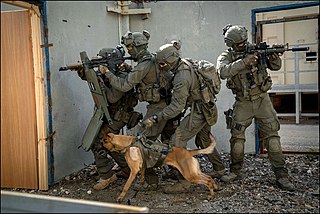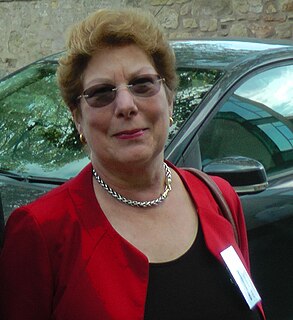
Terrorism is, in the broadest sense, the use of intentional violence for political or religious purposes. It is used in this regard primarily to refer to violence during peacetime or in the context of war against non-combatants. The terms "terrorist" and "terrorism" originated during the French Revolution of the late 18th century but gained mainstream popularity in the 1970s during the conflicts of Northern Ireland, the Basque Country and Palestine. The increased use of suicide attacks from the 1980s onwards was typified by the September 11 attacks in New York City and Washington, D.C. in 2001.

Counter-terrorism, also known as anti-terrorism, incorporates the practice, military tactics, techniques, and strategy that government, military, law enforcement, business, and intelligence agencies use to combat or prevent terrorism. Counter-terrorism strategy is a government's plan to use the instruments of national power to neutralize terrorists, their organizations, and their networks in order to render them incapable of using violence to instill fear and to coerce the government or its citizens to react in accordance with the terrorists' goals.

Roger D. Griffin is a British professor of modern history and political theorist at Oxford Brookes University, England. His principal interest is the socio-historical and ideological dynamics of fascism, as well as various forms of political or religious fanaticism.
Christian terrorism comprises terrorist acts which are committed by groups or individuals who profess Christian motivations or goals. Christian terrorists justify their violent tactics through their interpretation of the Bible, in accordance with their own objectives and worldview. These interpretations are typically different from those of established Christian denominations.
A lone actor, lone-actor terrorist, or lone wolf is someone who prepares and commits violent acts alone, outside of any command structure and without material assistance from any group. They may be influenced or motivated by the ideology and beliefs of an external group and may act in support of such a group. In its original sense, a "lone wolf" is an animal or person that generally lives or spends time alone instead of with a group.
Terrorism in Canada is a list of terrorist acts committed in Canada. Some acts of terrorism are related to external events and nationalities. Others, such as the FLQ crisis in the 1960s, are related to internal tensions within the country.
Right-wing terrorism or far-right terrorism is terrorism that is motivated by a variety of different right-wing and far-right ideologies, most prominently by neo-Nazism, neo-fascism, ecofascism, white nationalism, white separatism, ethnonationalism, religious nationalism, and anti-government patriot/sovereign citizen beliefs and occasionally by anti-abortion and tax resistance. Modern right-wing terrorism first emerged in North America during the Reconstruction era (1863–1877) and it later emerged in Western and Central Europe in the 1970s, and following the dissolution of the Soviet Union in 1991, it emerged in Eastern Europe.
Left-wing terrorism or far-left terrorism, sometimes called Marxist–Leninist terrorism or revolutionary/left-wing terrorism, is terrorism meant to overthrow capitalist systems and replace them with Marxist–Leninist or socialist societies. Left-wing terrorism also occurs within already socialist states as activism against the current ruling government. It has taken vivid manifestations across the world and presented diverging dynamics and relationships with national governments and political economies.
Radicalization is a process by which an individual or group comes to adopt increasingly radical political, social, or religious ideals and aspirations that reject or undermine the status quo or contemporary ideas and expressions of the nation. The outcomes of radicalization are shaped by the ideas of the society at large; for example, radicalism can originate from a broad social consensus against progressive changes in society or from a broad desire for change in society. Radicalization can be both violent and nonviolent, although most academic literature focuses on radicalization into violent extremism (RVE). There are multiple pathways that constitute the process of radicalization, which can be independent but are usually mutually reinforcing.
Critical terrorism studies (CTS) applies a critical theory approach rooted in counter-hegemonic and politically progressive critical theory to the study of terrorism. With links to the Frankfurt School of critical theory and the Aberystwyth School of critical security studies, CTS seeks to understand terrorism as a social construction, or a label, that is applied to certain violent acts through a range of political, legal and academic processes. It also seeks to understand and critique dominant forms of counter-terrorism.
Jeffrey Kaplan is an American academic who has written and edited a number of books on racism, religious violence, terrorism and the far right. He is an Associate Professor of Religion at the University of Wisconsin–Oshkosh and a member of the Board of Academic Advisors of the university's Institute for the Study of Religion, Violence and Memory.
Jessica Eve Stern is an American scholar and academic on terrorism. Stern serves as a research professor at the Pardee School of Global Studies at Boston University. Earlier she had been a lecturer at Harvard University. She serves on the Hoover Institution Task Force on National Security and Law. In 2001, she was featured in Time magazine's series on Innovators. In 2009, she was awarded a Guggenheim Fellowship for her work on trauma and violence. Her book ISIS: The State of Terror (2015), was co-authored with J.M. Berger.
Lorne L. Dawson is a Canadian scholar of the sociology of religion who has written about new religious movements, the brainwashing controversy, and religion and the Internet. His work is now focused on religious terrorism and the process of radicalization, especially with regard to domestic terrorists.
Maxwell "Max" Taylor is a Forensic and Legal psychologist. His early work specialised in the study of terrorism but he also became involved in the study of sex offenders, and in the development of capacity building activities for disadvantaged children in conflict zones, returning later to the study of terrorism.

There is a long history of terrorism in Europe. This has often been linked to nationalist and separatist movements, while other acts have been related to politics, religious extremism, or organized crime. Terrorism in the European sections of the intercontinental countries of Turkey and Russia are not included in this list.

Martha Crenshaw FBA is an expert in terrorism studies and senior fellow at the Freeman Spogli Institute for International Studies (FSI) and Center for International Security and Cooperation (CISAC). She is the professor of Political Science at Stanford since 2007.
The Norwegian Front was a neo-fascist extraparliamentary political party in Norway founded in 1975, led by Erik Blücher as fører. Following a bomb attack by an activist from the party, the NF was dissolved in 1979 and succeeded by the National People's Party, which itself was dissolved in 1991 after several leading members had received long prison sentences. The NF had around 1,400 members at its peak.
Incels, a portmanteau of "involuntary celibates", are members of an online subculture who define themselves as unable to find a romantic or sexual partner despite desiring one. Discussions in incel forums are often characterized by resentment, misogyny, misanthropy, self-pity and self-loathing, racism, a sense of entitlement to sex, and the endorsement of violence against sexually active people. The American nonprofit Southern Poverty Law Center described the subculture as "part of the online male supremacist ecosystem" that is included in their list of hate groups. Incels are mostly male and heterosexual. Many sources report that incels are predominantly white, although a group of researchers have argued that there is no definitive proof to support this claim. Estimates of the overall size of the subculture vary greatly, ranging from thousands to hundreds of thousands.

On June 17, 2019, a shooting occurred at the Earle Cabell Federal Building and Courthouse in Dallas, Texas, United States. No law enforcement officers or civilians were injured in the shooting, though one person sustained a superficial injury when she was taking cover. The shooter, identified as Brian Isaack Clyde, was then shot and killed by the federal security officer.
The Toronto machete attack was an attack in a Toronto massage parlour on 24 February 2020.






